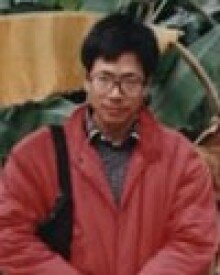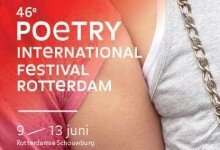
In his own words, Lü De’an is a happy poet. This may have something to do with the fact that he was originally inspired by love to write. In a recent interview with Zeng Hong, he makes the following remark about his own work:
“On the whole, an important feature of my writing over the past 20 years is, from the perspective of life experience, delight, a delight which is always permeated with a kind of innocence or the arrogance of the self-taught.”
Lü De’an’s innocence, his arrogance of the self-taught, is no mere bravado. It amounts to a belief of the powers of the unconscious in the role of creation. In a recent collection of essays on poetry, Wu Sijing quotes nineteenth-century Mexican poet Manuel Gutiérrez Nájera’s image of “that silent black flow” to exemplify this force. It is an idea beautifully expressed in the writings of Gaston Bachelard, the French critic of the poetic imagination. “Liquidity” he writes in L'eau et les rêves, “is . . . the very desire for language. Language wishes to flow.” The essential factor is dynamism. Unlike the largely fixed (and, therefore, hugely redundant) nature of much so-called 'communicational' language, poetry is motion. Or, as Lü himself expresses it, “poetry means that form of writing most capable of providing a motion internal to language”.
Lü De’an, a native of Fujian province, was born in 1960. His initial interest in poetry was sparked by the emergence of the so-called “obscure” poets at the end of the 1970s, and his friendship with Shu Ting, another Fukienese who is probably one of the most extraordinary Chinese poets of the second half of the twentieth century, but he trained as a commercial artist, and has learned much from modernist painting as a poet. He was associated with the Nanjing-based ‘Them’ [Tamen] group, and published frequently in its unofficial journal which was launched in 1985. ‘Nude’, a poem from the Them Decade Anthology, is quietly paradoxical:
No one wakes earlier then she does . . .
The one to feel that she is the single
ray of light in the room is her
own crow there on her snow-white skin.
The dark night is cold, and although never completely invading
nor does it entirely recede. Outside her window
on true snow grounds, a crow is
ascending. (1991)
Lü’s published individual collections include, to date, North of South [Nanfang yi bei], Paper Serpent [Zhi she] and Another Half of Life [Ling yiban shengming]. Important in terms of his life experience was the time he spent in New York between the years 1991 and 1994 (New York serves a faint back-drop to his poem ‘As Told to the Poet: 1’). To this day, he continues to pursue a career as a poet and a painter, and currently works freelance.
I think a lot can be gleaned from Lü’s poetic vocabulary. It is surely no coincidence that shui, the Chinese word for ‘water’, appears over and over in his writing, as well related items such as ‘pond’ and ‘rain’. Puzzling, perhaps, is the persistent occurrence of the virtual antonym, ‘stone’, but this is may be partially be explained by the fact that Lü lives in a small house in the mountains. It may be also related to the volatile nature of water, for, as Bachelard points out, “water is truly the transitory element”. The house itself, and interiors in general, are suggested by the prevalence of the word wuding (roof), an index of the mundane. At the same time, the sheltering house serves as a site for dream, a vital element in Lü’s poetic lexicon (see ‘Soul Lake’, for example, as well as ‘As Told to the Poet: 1’). Related to this is Lü’s repeated references to xuwu (nothingness ), you’an (gloomy) and hei (dark[ness]).
One fascinating word-choice is ‘music’, a word which seems to have a very particular resonance for Lü. In ‘The Hippopotamus’, for instance, this most untuneful animal is associated with “sound-slumbering music”, an altogether unexpected conjunction. In fact, as the poem ‘Mountains’ Ecstasy’ suggests, music in Lü De’an’s treatment of the word has little to do with physical sound:
this endless range of mountains holds all of our music:
a resplendent and motionless tree
a patch of azure-intersticed cloud
an incinerated plummeting angel
Ironically, Lü De’an displays little interest in conventional musicality in his poetry. His use of sonic effects is, at best, austerely discreet: alliteration and internal rhyme are employed to lend coherence to his compositions, but they are background, they never dominate the score. Rather than referring to harmony or melody, music for Lü is strictly vibrational: anything that resonates with our emotions or our psyches is, for him, authentically musical. For this reason, Lü De’an’s music is something to be dug for, existing only in the mind's underground. As he writes in ‘Zither’ (not translated in this quarter’s selection):
He puts the zither in no special place
But in his ears someone continues to excavate
The sound is as distant as day, like the fingers
Of a blind musician in hell . . .
On the other hand, Lü does make skilful use of metaphor and simile. Still on a musical theme, in the poem ‘Portrait’ he makes a comparison between cicada-sound and the clamour of the blacksmith’s:
afternoon, the scrawl-like racket of the cicadas
holds all the music of the blacksmith's
the lump of hissing pig iron
that never ever changes shape
More than poetic resources, it is the play of ideas that stands at the centre of Lü De’an’s creative universe. In the process of reading, the chief skill lies in being able to track the association of images and to reflect on the implications of their connection. This, in most cases, can only be a slow, meditative process. Sometimes, I sense, it is the aura of emotions or sensations around the images that count for most. Translating Lü’s work is occasionally frustrating because the relative simplicity of his vocabulary and syntax coincides with a highly elusive “argument”. At times I could only agree with the view expressed in ‘As Told to the Poet: 1’: “if you ask me What on earth does it mean?—even that “between the lines”/ apparently discloses someone's whole life casually described— / I can only keep silent.”
In other words, the poems pose a significant challenge. Their shimmering, fluctuating surfaces suggest heat waves over an Egyptian desert and in many ways, they play on the notion of ‘mirage’, mirroring things that only exist over another horizon. And yet, I grow steadily convinced of the rewards to be had from a persistent reading. My own breakthrough came with the lines that conclude ‘Untitled (The sky resembles a whetstone)’. In it, I felt, for a whole split-second, the approach of something like eternity:
Like lightning my cat scrambles out of the way up onto the roof
Because a stranger has arrived
On the one hand gesticulating, on the other
Putting a hand on my shoulder, he seems to be in a hurry
And at the same time it would seem in this moment of twilight
That he would take me away forever with him
I encourage you to give these poems time and to discover, through Lü De’an, that face in the centre of the lake.
Interview
Poetry in Motion
Links
Chinese version of Zeng Hong's interview with Lü De’an
Language: Chinese
The Queensland Government, through Arts Queensland, has provided $5000 to Simon Patton and Poetry International Foundation for the China domain of Poetry International Web.

I would also like to thank the Australia-China Council for allowing me to spend one month at the Taipei International Artist Village in November-December 2002. Preliminary reading for the translation of Lü De’an’s work was one of the projects I completed during my residency there. Many thanks again to all the people at TAV, especially Director Lu Chien-Ying, Amber Wang, Hung Hsuan-Hung and Sappho.

Finally, I am also grateful to Su Yongli of the University of Queensland for her comments and suggestions regarding the translations of Lü De’an’s poems as well as his interview with Zeng Hong.







